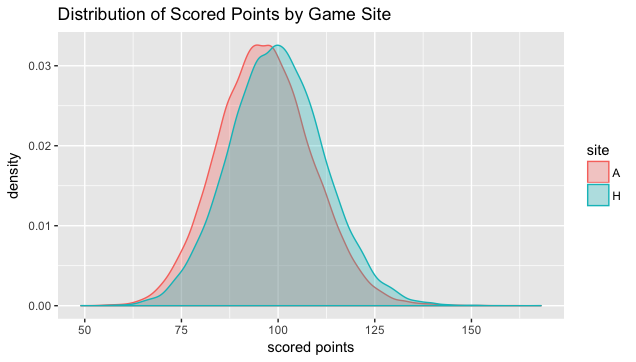
If you ever watched a sports game, you’ve probably heard of the term “home court advantage“. Home court advantage refers to the notion that a team has a certain advantage over its opponent while playing at a home city venue as opposed to playing at away games.
I wanted to delve into this phenomenon deeper and understand the source of this advantage. Where does this “advantage” originate from and how does it work?
To examine this, I decided to look at all the regular season games from 1995 through 2016 season. I looked at the teams’ win percentages by home and away.
| Win Percentage @ Home | Win Percentage @ Away |
|---|---|
| 59.83% (15548 out of 25986) | 40.17% (10438 out of 25986) |
It was evident that teams were more likely to win at home than while playing away. But the question was, why? Did they score more points at home than while they were away? Maybe home teams secretly benefitted from referees’ foul call favors?
I decided to look at how teams’ average scored points differed by game site (home/away).

| Avg. Points @ Home | Avg. Points @ Away | Difference |
|---|---|---|
| 99.73 | 96.63 | 3.1 |
There was clearly a notable difference (of more than 3 points on average) between how teams scored at home vs how teams scored at away. However, these figures were misleading because they didn’t account for other variables in play. (In statistical terms, we failed to account for confounding variables.)
Specifically, we saw earlier that teams tend to win more games at home. Maybe this points difference had more to do with the fact that teams generally won more games at home than at away. Because they won more games at home, their average points @home was higher than average points @away–NOT necessarily because teams inherently scored more points at home than at away.
If I were to make a fairer comparison, I would have to compare:
● won games @home vs. won games @away
● lost games @home vs. lost games@away
Instead, the above figures were comparing:
● (60% won + 40% lost games) vs. (40% won + 60% won games)
With such lopsided comparison, we had no way of knowing if teams inherently scored more point @home than @away because I didn’t control for other variables.
So I reformulated the question: “Do teams score more at home, given the same game outcome?”
That’s essentially asking the following questions:
● “In games won, do teams score more points at home than at away?”
● “In games lost, do teams score more points at home than at away?”
| Game Outcome | Avg. Points @ Home | Avg. Points @ Away | Difference |
|---|---|---|---|
| Won Games | 104.06 | 102.94 | 1.12 |
| Lost Games | 93.28 | 92.39 | 0.89 |
When I accounted game outcome as a variable, the difference in scored points between home games and away games became less stark.
The differences were still there and they were statistically significant differences. Nonetheless, this suggested to me that there were other variables in play that helped teams win more games at home, other than simply being able to score more points. There seemed to be other driving forces to this “home court advantage” phenomenon.
Maybe referees were dishing out foul call favors for the home team and against the away team?
I am planning to explore this topic more thoroughly in the future. Stay tuned.

